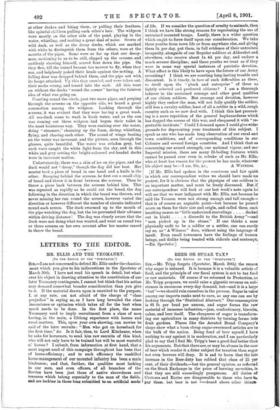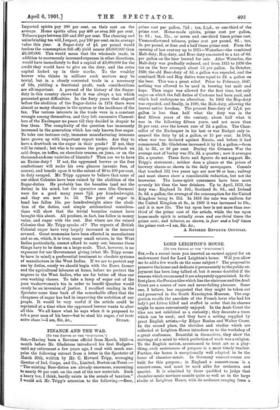BEER OR SUGAR TAX P
(TO THE EDITOR OF THE "SPECTATOR.")
Sin,—Mr. Tripp forgets (Spectator, March 30th) the reason why sugar is untaxed. It is because it is a valuable article of food, and the principle of our fiscal system is not to tax food or raw materials. Of course if we returned to Protection, as Mr. Tripp proposes, we could raise a gigantic revenue on sub: stances in enormous every-day demand, but—and it is a large " but"—we should ruin ourselves in the process. Sugar in value among our imports ranks next to corn, as any one can see bY looking through the "Statistical Abstract." Our consumption is 91 lb. per head per annum, and sugar forms the raw material of immense industries,—jam, confectionery, biscuits, cakes, and beer itself. The cheapness of sugar is transform- ing our agriculture in many districts by turning farms into fruit gardens. Places like the Aerated Bread Companfti shops show what a boon cheap sugar-sweetened articles are to the bulk of the nation. Being fond of beer myself, I have nothing to say against it in moderation, and I am particularly glad to say that I find Mr. 'Tripp's beer a good deal better than his arguments. But that there are, or may be, abuses in the case of beer which render it a fitter subject for taxation than sugar not even brewers will deny. It is sad to learn that the late increase in. the Beer-duty has robbed that class of 25 pet' cent, of their dividends,—but the general opinion, as reflected on the Stock Exchange in the price of brewing securities, is that they are still exceedingly prosperous. All duties of Customs and Excise are disagreeable to those who have t.f.• pay them. but beer is not imrdened above other thin. Imported spirits pay 200 per cent. on their cost on the average. Home spirits often pay 400 or even 500 per cent. Tobacco pays between 250 and 300 per cent. The cheering and uninebriating tea will, I expect, pay 100 per cent. on its average value this year. A Sugar-duty of id. per pound would (unless the consumption fell off) yield nearer 28,000,000 than £6,500,000. This would mean that the wholesale trade, in addition to enormously increased expenses in other directions, would have immediately to find a capital of £8,000,000 for the credit they would have to give on the duty, and the extra capital locked up in their stocks. To the wealthy brewer who thinks in millions such matters may be trivial, but in a closely contested trade in a necessary of life, yielding a fractional profit, such considerations are all-important. A perusal of the history of the Sugar- duty in this country shows that it was always a tax which presented great difficulties. In the forty years that elapsed before the abolition of the Sugar-duties in 1874 there were almost as many changes in the system or the incidence of the tax. The various interests in the trade were in a constant wrangle among themselves, and they left successive Chancel- lors of the Exchequer no peace till they decided in despair to free them. The complexity of the question has immensely increased in the generation which has only known free sugar. To take one instance only, immense manufacturing interests have grown up with important export trades. Are they to have a drawback on the sugar in their goods ? If not, they will be ruined; but who is to assess the proper drawback on acid drops, on toffee, on chocolate creams, on jams, or on the thousand-and-one varieties of biscuits ? Then are we to have an Excise-duty ? If not, the oppressed brewer or the free confectioner will make Ibis own glucose (arsenic free, of course), and benefit upon it to the extent of 80 to 100 per cent. in duty escaped. Mr. Tripp appears to believe that some of our oldest Colonies have been rained by the abolition of the Sugar-duties. He probably has the bounties (and not the duties) in his mind, but the operative ones (the German) were for a good many years 70. per hundredweight, and they are now is. 3d. The price of sugar in bond has fallen 15s. per hundredweight since the aboli- tion of the duties, and simple arithmetical considera- tions will show that the trivial bounties cannot have brought this about. All produce, in fact, has fallen in money value, and sugar with the rest. But where are the ruined Colonies that Mr. Tripp speaks of? The exports of British Colonial sugar have very largely increased in the interval covered. Great economies have been effected in manufacture and so on, which, it is true, many small estates, in the West Indies particularly, cannot afford to carry out, because these things have to be done on a large scale. That, however, is no argument for our Government giving (what Mr. Tripp seems to have in mind) a preferential treatment to obsolete systems of manufacture in the West Indies. If we are to protect any one by duties, surely we should begin with the Essex farmer and the agricultural labourer at home, before we protect the negroes in the West Indies, who are far better off than our own working classes. To take a lump of sugar out of the poor washerwoman's tea in order to benefit Quashee would surely be an inversion of justice. I recollect reading in the Spectator some time back of the remarkable effect that the cheapness of sugar has had in improving the nutrition of our people. It would be very useful if the article could be reprinted at a time when the oppressed brewer wants to alter all this. We all know what he says when it is proposed to rob a poor man of his beer—but to steal his sugar, c'eet touts







































 Previous page
Previous page